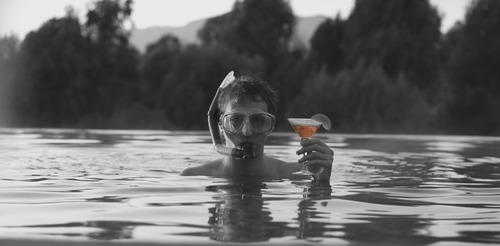
"But masters, remember that I am an ass, though it be not written down, yet forget not that I am an ass."
In 1993, Kenneth Branagh brought one of Shakespeare's most beloved comedies to the big screen with his star studded film adaptation of Much Ado About Nothing. Virtually everything about that film is perfect, with the glaring exception of Keanu Reeves, so why then do we need another film version of Much Ado? I guess the simple answer is, why do we ever need another version of any Shakespeare play on film... a new concept.
Joss Whedon, at first glance, seems an unlikely filmmaker to try his hand at Shakespeare, but in the wake of shooting last year's The Avengers, he gathered several friends for two weeks at his home and shot a new vision of Much Ado. Beyond filming it in black & white and in modern dress, did Whedon do anything that merited another adaptation? Read on to find out...
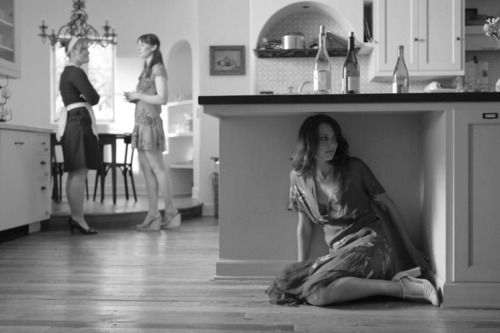
I'm happy to report that while this isn't quite as good as Branagh's version, it's still a solidly entertaining film with lots of performances and directorial choices to admire. Much Ado tells the story of Leonato (Clark Gregg), a nobleman welcoming a squad of soldiers back from a victorious battle. The details of the battle and what kind of soldiers they are is a bit fudged in this version, but I digress. The soldiers are bachelor-for-life Benedick (Alexis Denisof), lovelorn Claudio (Fran Kranz), malicious Don John (Sean Maher), and are led by John's brother Don Pedro (Reed Diamond). Claudio is immediately smitten with Leonato's daughter Hero (newcomer Jillian Morgese), and Don Pedro sets about a plan to woo Hero to Claudio's side, and secure the blessings of her father.
Benedick, meanwhile, finds himself confronted with an old romantic adversary, Leonato's niece Beatrice (Amy Acker). The assembled set in motion of course of events that attempts to drive the two sworn enemies into each other's arms. In the midst of all this, Don John concocts a plan to trick Claudio into thinking that Hero has been unfaithful to him, and the lovers are threatened to be torn apart by this deception. Since this falls under the guise of one of Shakespeare's comedies, we know everything will turn out alright in the end, but the series of events that get us there is where the true joy in watching this story unfold lies.
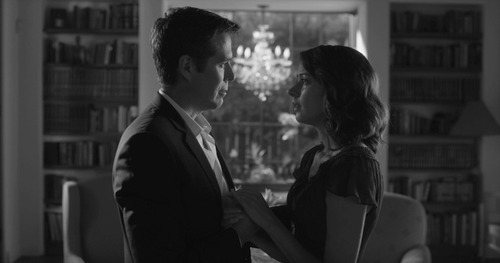
First things first, Whedon wisely takes a page out of another director's handbook to help flesh out the characters. One of the main things I liked about Michael Hoffman's 1999 film of A Midsummer Night's Dream was how he added in wordless asides and flashbacks that served to build up the characters' backstories. Whedon does the same here, opening on a doomed one night stand between Beatrice & Benedick that serves to illustrate why these two dislike each other so much from the start. There are a lot of other moments like this throughout the film, many of them involving the buffoonish constable Dogberry (Nathan Fillion), that added dimension to the story without having to attempt to reword or unnecessarily move the dialogue around.
The film is brilliantly composed and shot in gorgeous black & white, one of the major advantages of digital filmmaking. Black & white takes on a lustrous tone here, and the work by cinematographer Jay Hunter is very good. The score, done by Whedon himself, is also very good, including a nice, jazzed up version of "Hey Nonny Nonny" that accompanies the masked ball scene early in the film. There are probably several nitpicky things that I could call out in regard to the time period lapses and the virtual non-explanation of what war and where these soldiers are coming from, but the words override all else, and it's a doozy of a script.
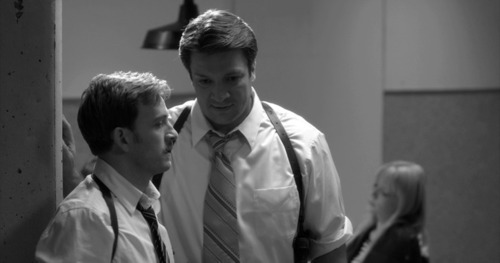
The performances, sadly, are a mixed bag. While some of the actors handle the Shakespearian dialogue with aplomb, it very quickly sinks some of the others. Denisof & Acker are both good as the two leads, but they pale in comparison to the lively wordplay achieved by Branagh & then-wife Emma Thompson in the 93 film. It's almost unfair to make the comparison, but as good as they are, they end up feeling like pale imitators in the end. Reed Diamond as Don Pedro & Clark Gregg as Leonato are far and away the most natural with the dialogue, and their scenes together elevate the rest of the film.
Fran Kranz does some interesting things with his character, infusing his dialogue with modern pauses and tics, but Claudio is such a banal character that it's really difficult to be excellent while playing him. Likewise Morgese as Hero, it's just an underwritten character, but she does a fine job with it. As much as I love Nathan Fillion as an actor, he flounders a bit as Dogberry, trying to underplay everything, and most of his laugh lines landed with a thud. Two of the worst offenders, however, are Don John's co-conspirators Borachio (Spencer Treat Clark) & Conrade (Riki Lindholme). While both attractive young actors, they feel oddly out of place, and their villainy reads more like boredom or a fundamental misunderstanding of their characters.
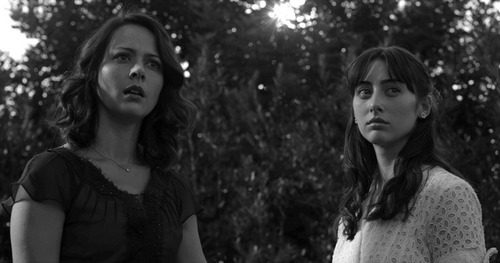
Much Ado About Nothing is a risky experiment that almost completely pays off. Thankfully Whedon understands the characters and the dialogue enough to keep things moving lightly for much of the 107 minute running time, and his final shot is absolutely gorgeous, the kind of thing that proves what a fantastic director he is. Most of my grievances are of the nitpick variety, so please don't let that dissuade you from seeing it. If you're a fan of Shakespeare or the Whedon-verse in general, I highly recommend Much Ado. It's one of the better film adaptations of Shakespeare to come out in recent years, and I can only hope he does more down the line.
GO Rating: 3/5

[Photos via BoxOfficeMojo]
No comments:
Post a Comment